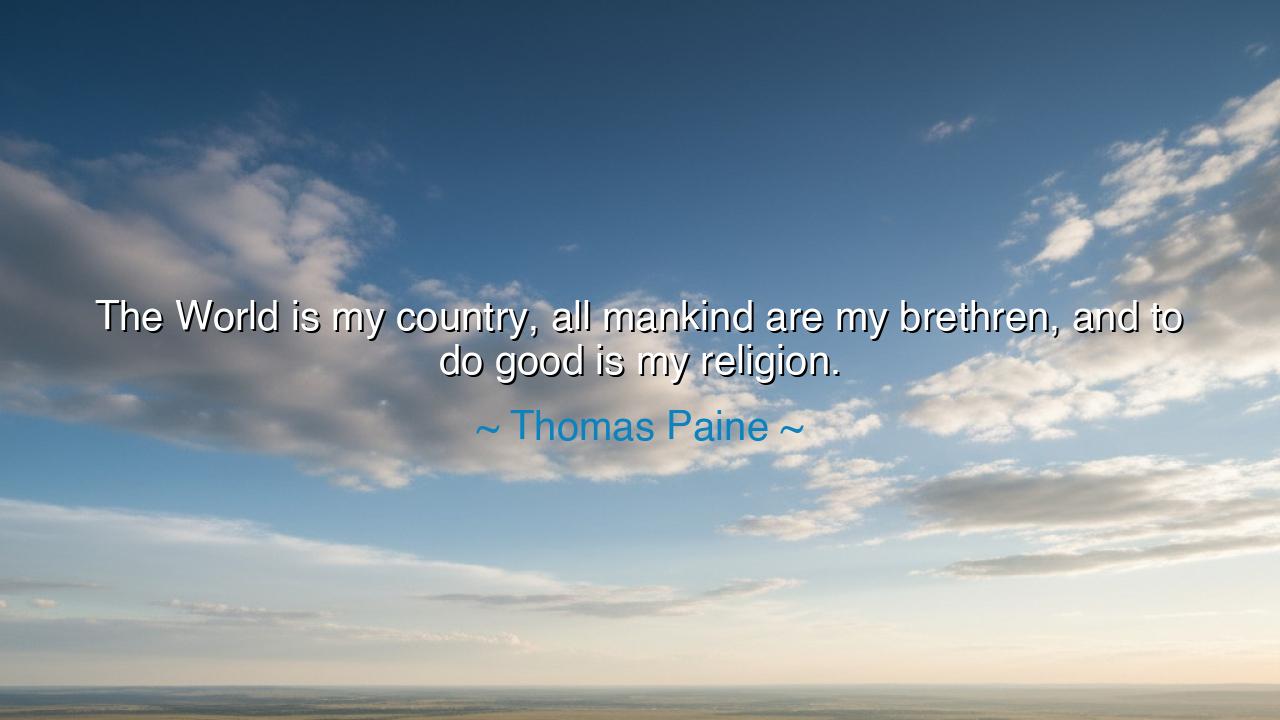
The World is my country, all mankind are my brethren, and to do






"The World is my country, all mankind are my brethren, and to do good is my religion." Thus declared Thomas Paine, the firebrand philosopher of liberty, whose pen burned with the light of reason and the passion of compassion. In these immortal words, he tore down the walls that divide men by nation, creed, and tribe, and proclaimed the universal kinship of the human soul. It was a declaration not of rebellion alone, but of enlightenment—a vision of a world where boundaries of race, religion, and empire would dissolve before the greater law of conscience and love. Paine, who had witnessed both the birth of America and the storms of revolution in France, spoke as one who had seen too much blood spilled in the name of difference. To him, the only true citizenship was in humanity itself, and the only true worship was in doing good.
The origin of this quote lies in Paine’s later work, The Rights of Man (1791), written in defense of the French Revolution and against tyranny in all forms. Having fought for freedom in the New World, Paine turned his eyes to the Old, and saw monarchies crushing their peoples under the pretense of divine order. He saw religion wielded as a weapon to divide hearts, to sanctify war, and to keep men in bondage. And so, he raised his voice not against God, but against the corruption of His name. Paine envisioned a faith not bound to temple or throne, but born in the heart of every person—a faith that transcends dogma and calls each man and woman to the sacred duty of goodness.
In saying, "The world is my country," Paine cast aside the narrow loyalties that pit neighbor against neighbor. He spoke as one who had crossed oceans for freedom, and who knew that liberty cannot be the possession of one nation alone. The patriot, he believed, must be guided not by borders but by justice; not by allegiance to soil, but by allegiance to truth. In an age when nations raised banners soaked in blood, Paine dared to imagine a world united not by conquest, but by compassion. He was, in spirit, a citizen of the cosmos—a man who saw the earth not as divided territories, but as one home for all humankind.
And when he said, "All mankind are my brethren," he reached to the very heart of morality. Paine rejected the arrogance of sect and caste, for he had seen how power cloaked itself in superiority. To him, the beggar and the king, the slave and the scholar, the believer and the skeptic—all were children of the same breath, fashioned by the same divine mystery. In this, he echoed the wisdom of the ancients, who taught that to harm another is to harm oneself, for all are bound by the same thread of life. His was a revolutionary compassion, daring to embrace even those who cursed him, and to love even those who opposed his ideals.
"To do good is my religion"—here lies the core of Paine’s creed, radiant and eternal. He rejected the idea that salvation could be found in ritual alone, or that holiness was the privilege of the priest. For Paine, goodness itself was the highest form of worship. To feed the hungry, to defend the oppressed, to speak truth without fear—these were the sacraments of his faith. Like the Stoics before him, he believed that virtue is the only true temple, and that the divine does not dwell in stone, but in the human heart that acts with courage and compassion. His religion was not one of division, but of unity; not of doctrine, but of deed.
Consider how his words echo through the ages. When Mahatma Gandhi led India’s struggle for independence, he too spoke of universal love, saying, “My nationalism is humanity.” When Martin Luther King Jr. marched through the streets of America, he carried the same torch, proclaiming, “We must learn to live together as brothers or perish together as fools.” Both men, like Paine, saw beyond the color of flags and the language of faith; they saw the soul of mankind as one. Their revolutions were not of arms, but of spirit—a fulfillment of Paine’s belief that to do good is to serve the highest law of heaven.
Thus, my listener, take this teaching to heart. Be a citizen not of one nation, but of the world. Let your loyalty be to truth and kindness above all creeds and crowns. Do not ask who is your neighbor—see all as your kin. When you encounter suffering, do not turn away because it lies beyond your borders; for the heart that feels compassion knows no boundary. Live your religion through action, not through judgment; through mercy, not through pride. The soul that acts with goodness is holier than the one that prays without love.
For in the end, Paine’s words call not for rebellion alone, but for awakening. He teaches us that freedom is not only a right, but a responsibility—to see all men as brothers and all women as sisters, and to build a world where no one is stranger. When nations fade and empires crumble, this truth will remain: the world is our country, love is our law, and doing good is our faith.






AAdministratorAdministrator
Welcome, honored guests. Please leave a comment, we will respond soon